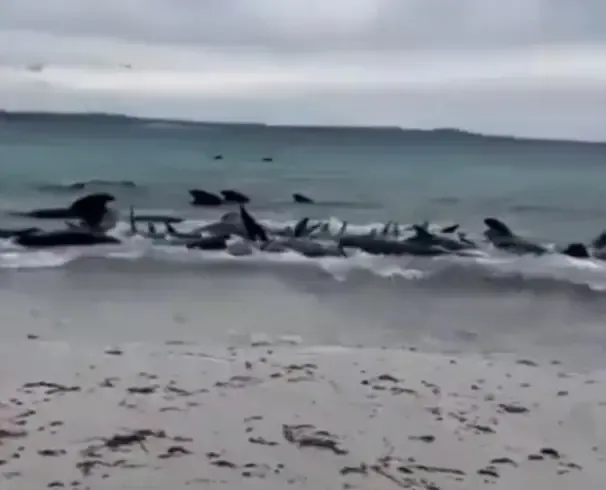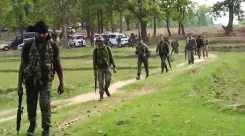Tasmania Plans to Euthanize 90 Stranded False Killer Whales

Synopsis
Key Takeaways
- Approximately 90 false killer whales will be euthanized.
- The initial pod consisted of 157 whales.
- Attempts to refloat some whales were unsuccessful.
- This is the first mass stranding of false killer whales in Tasmania since 1974.
- Reasons for the stranding are currently unknown.
Sydney, Feb 19 (NationPress) Approximately 90 surviving false killer whales are set to be euthanized following the stranding of a pod of 157 on a beach in Tasmania, Australia. Officials reached the remote beach on Tasmania's northwest coast on Wednesday, confirming that 90 of the false killer whales were still alive, as discovered by a local resident the previous evening.
Teams comprising wildlife veterinarians and personnel from Tasmania's Parks and Wildlife Service (PWS) and Marine Conservation Programme made multiple attempts to refloat two whales on Wednesday, but these efforts proved unsuccessful.
PWS Incident Controller Shelley Graham informed the media on Wednesday afternoon that the whales were repeatedly re-stranding and that the forecast indicated similar conditions would persist for the next two days.
“After thorough evaluations by wildlife veterinarians, we have decided to proceed with the euthanasia of these animals,” she stated.
Deputy Incident Controller Kris Carlyon mentioned that the euthanasia would be conducted via firearm.
He characterized the remote site as “potentially the most challenging” for such a stranding throughout his 16-year tenure.
The PWS estimated that the whales had been stranded for 24-48 hours, as reported by the Xinhua news agency.
PWS liaison officer Brendon Clark noted at a press conference in Hobart on Wednesday morning that this was the first documented mass stranding of false killer whales in Tasmania since 1974, when around 160 whales were involved.
“It’s a tragic scene: over 150 small killer whales have washed ashore in Tasmania. This incident marks the first of its kind in the last 50 years in this area,” a local resident shared on social media. “Many of the mammals are still alive and fighting for their lives. The reasons behind this stranding remain unclear.”









